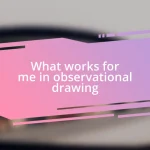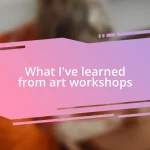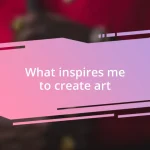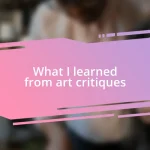Key takeaways:
- Community theater fosters deep connections and personal growth, transforming cast members into a close-knit family while enhancing creativity and collaboration.
- Performing requires embracing vulnerability and self-discovery; each role not only challenges actors but also reveals hidden strengths and deeper aspects of their identities.
- Constructive feedback and resilience are vital for an actor’s development; mistakes can lead to authentic moments that connect performers with their audience on a profound level.

My journey in community theater
Stepping onto the community theater stage for the first time was both exhilarating and terrifying. I remember how the spotlight felt blinding, yet somewhere in that moment, I found a sense of belonging I hadn’t anticipated. Have you ever felt that thrill of discovering a passion you didn’t know you had?
As rehearsals unfolded, I formed bonds with cast members who felt more like family than mere acquaintances. There was one night when we all shared personal stories while waiting for our scene to go up, laughter mingling with vulnerability, creating a safe space where we could truly be ourselves. Isn’t it fascinating how theater can transform mere strangers into a close-knit community?
During the final performance, my heart raced with a mix of excitement and nostalgia. As I took my final bow, I felt an overwhelming wave of gratitude for the experience. It made me ponder: what gifts does theater bring to our lives beyond the stage? Those moments of shared joy and artistry stay with me, like cherished memories that fuel my creativity even today.

Discovering community theater
Discovering community theater was a journey I never expected to undertake, yet it opened my eyes to a vibrant world of creativity and connection. The first time I stepped into the rehearsal space, I was struck by the eclectic mix of emotions swirling around me. The nervous energy, the laughter, and the shared anticipation of bringing a story to life felt intoxicating. I vividly recall one afternoon when we staged an impromptu scene, and that raw, unpolished moment revealed the pure joy of collaboration that community theater offers.
- Connection: Each cast member brought unique stories and perspectives, enriching our shared experience.
- Growth: I saw growth not just in my acting skills, but in how I engaged with others—trust and vulnerability became powerful tools.
- Creativity: The freedom to explore characters and narratives encouraged me to embrace my own creativity beyond the stage.
- Support: The sense of belonging and support was palpable, making even the most daunting scenes feel manageable.
- Friendship: I formed friendships that extended beyond rehearsals, leading to coffee meetups and brainstorming sessions for our next production.
These moments taught me that community theater is more than just a performance; it’s a sanctuary where creativity thrives and bonds are cultivated.

Finding the right role
Finding the right role can feel like a puzzle, where every piece counts. I remember the first auditions I attended. I struggled between roles that seemed to fit my personality and those that pushed my boundaries. It was a thrilling yet daunting choice. Participating in different auditions showed me that versatility can lead to unexpected joy. Sometimes, a role I initially thought was out of my comfort zone turned out to be the one I cherished the most.
As I navigated the casting process, I learned one key insight: alignment with the character’s journey often trumps the role’s significance in the story. I recall auditioning for a small but pivotal role once, and the director shared how it could bring depth to the main character. I took a chance and embraced the opportunity, pouring my heart into the backstory and motivations. In return, I discovered layers within myself that I didn’t know existed. Have you ever found surprise strengths when you stepped outside of your usual choices?
Ultimately, I believe finding the right role is about self-discovery and connection. With each character I embodied, I not only performed but also unearthed parts of my identity. The journey is not just about fitting in; it’s more about how each experience shapes us as artists. Looking back, those auditions didn’t just test my acting skills; they influenced how I viewed collaboration, creativity, and even myself.
| Role Type | Considerations |
|---|---|
| Lead Role | Requires strong performance skills and a lot of stage time. |
| Supporting Role | Offers a balance between spotlight time and exploring character depth. |
| Ensemble Role | Focuses on teamwork and collaborative storytelling. |
| Character Role | Allows for unique expression and creativity; often outside your natural persona. |

Preparing for auditions
Preparing for auditions is a thrilling mix of excitement and nerves. I remember the nights leading up to my first audition, pacing around my living room, rehearsing my lines in front of a mirror. Have you ever felt that jittery anticipation—the kind that makes your heart race and your palms sweat? I definitely have, and it taught me the importance of preparation. Careful practice not only helped me memorize my lines but also allowed me to discover how to infuse my character with authenticity and depth.
Selecting the right material for your audition can be a game changer. One time, I chose a monologue that resonated with my personal experiences, and it made all the difference. The emotions poured out of me naturally, and I felt a connection to the character that electrified the room. It was a reminder that understanding your chosen piece is crucial—the more you relate to it, the better you can portray it. So, what should you look for in a monologue? I suggest finding something that not only showcases your skills but also reflects a part of you.
Lastly, don’t overlook the significance of feedback from others. Before my auditions, I always sought out friends or fellow actors to perform in front of. Hearing their thoughts and insights helped me fine-tune my performance and build my confidence. It turned what can be a solitary experience into something truly collaborative. Have you ever shared your work with someone and felt that rush of encouragement? That support is invaluable—it helps not just in preparing effectively but also in cultivating a mindset geared for success.

Overcoming stage fright
Overcoming stage fright is a journey many actors face, and I can definitely relate. I remember stepping onto the stage for the first time—my heart raced like a wild drumbeat, and I could feel my palms growing clammy. That adrenaline, while intimidating, also sparked something within me. I soon realized that embracing those nerves could transform them into powerful energy. Have you ever felt fear morph into excitement?
I found that rehearsing with my fellow cast members was a game changer. Sharing our vulnerabilities brought a sense of camaraderie that eased my tension. One night, before a big performance, we huddled together, exchanging jokes and pep talks. In that moment, I recognized we were all in this together, alleviating some of the pressure. Could the collective support of my peers provide the comfort I needed to shine? Absolutely—it turned stage fright into a shared experience rather than an isolating burden.
Interestingly, I also learned the value of visualization techniques. Before going on stage, I would close my eyes and picture myself delivering each line with confidence. One time, I envisioned the audience smiling and fully engaged, and it surprisingly grounded me. Have you ever tried visualizing success before a big moment? It has the power to create a mental space where fear diminishes, and readiness takes its place.

Collaborating with the cast
Collaborating with the cast is an experience that can transform the way you approach theater. I’ll never forget the first time I connected with my fellow actors during a rehearsal. We spent hours going over our scenes, but it was those moments when we’d break out into laughter or share stories about our characters that really built our bond. Have you ever felt a sense of unity that just clicks? In those shared experiences, I found not just colleagues, but friends who inspired me to dive deeper into my role.
Another significant aspect was how we supported each other’s creative choices. I remember one rehearsal when a cast member had a unique take on a scene. Rather than just sticking to the script, they injected their interpretation with raw emotion. At first, it surprised me—could this change the dynamics? But observing their passion encouraged me to explore my own character’s depth, leading to a thrilling synergy. Isn’t it fascinating how sharing creative perspectives can elevate a performance? It’s like a ripple effect, where one person’s brilliance shines light on another.
Finally, the importance of open communication with fellow cast members cannot be overstated. I discovered early on that discussing our thoughts, challenges, and even fears brought us closer. During one particularly tough rehearsal, I shared my struggles with a specific line, and immediately another actor chimed in with a similar experience. That instant relief of knowing we were all navigating through similar trials made a real difference. Have you ever found strength in vulnerability? In the theater, it cultivates a supportive environment, fostering collaborative creativity that ultimately enhances the entire production.

Lessons learned from performances
There’s a profound lesson in embracing feedback after performances. I vividly recall a night when we received critiques from our director, and my initial reaction was defensive. I realized, however, that feedback was not an attack but rather an opportunity for growth. Have you ever hesitated to hear constructive criticism? That night taught me how to listen openly, enabling me to take my performance to new heights with each subsequent show.
Another essential takeaway was learning the beauty of resilience. I had a particularly challenging scene where everything seemed to go wrong—my lines stumbled out like a clumsy dancer. Instead of succumbing to embarrassment, I decided to own that moment. What would happen if I turned a mistake into an unexpected twist? The audience’s laughter reminded me that authenticity often shines brighter than perfection. This experience reinforced the idea that mistakes are simply stepping stones to improvement.
Lastly, I discovered that performances are a mirror reflecting not only our skills but also our emotions. During one heartfelt scene, I unexpectedly found myself tearing up, feeling utterly exposed. It struck me that vulnerability was not just a personal experience but also a deep connection to the audience. Have you ever expressed a raw emotion in front of others? That moment taught me that, in theater, sharing our truths creates an unspoken bond that resonates far beyond the stage.














